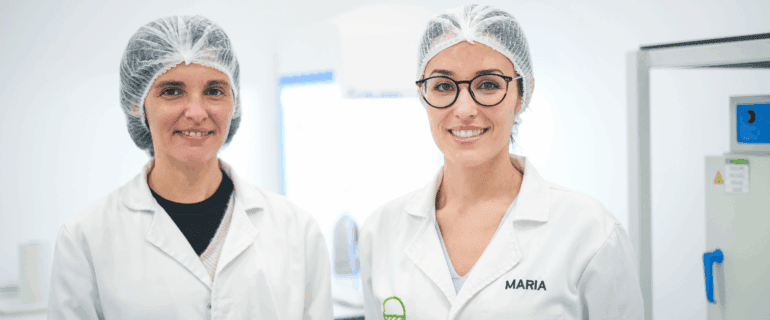Quality at Tigernuts is more than an obligation. Historically, the company has strived to evolve and improve all its processes year after year, step by step. Tigernuts has just achieved over 95% compliance in its latest IFS Food certification audit, its highest score to date. It’s the perfect opportunity to speak with María Blay, Head of Quality at Tigernuts, and understand how such recognition has been achieved.
Who are you and what is your role at Tigernuts?
My name is María Blay, and I am the Head of the Quality Department at Tigernuts. My role is to ensure compliance with quality and food safety standards from the very first communication with suppliers—both of raw materials and auxiliary materials—until the end of the final products’ shelf life.
I also coordinate the team and support other departments as we work on continuous improvement.
How does the Quality Department work and what areas does it cover?
Our department works collaboratively with the rest of the company.
We are responsible for food safety, supplier control, inspection of raw materials, intermediate products, and final products, monitoring of the production process, audits, documentation management and certifications.
We also manage training and improvement actions.
We ensure that quality is present at every step.
What is Tigernuts’ background with IFS?
The company began with the precursor to IFS Food, IFS Global Markets. This category of IFS is designed for companies that want to begin working toward IFS Food but need to progress gradually to meet all the standard’s requirements.
From 2018 to 2020, we were certified under IFS Global Markets, and in 2021 we obtained our first IFS Food seal. In recent years, we have also incorporated the IFS Carbon Footprint and IFS ESG Check modules, reinforcing not only quality but also our commitment to sustainability and social responsibility.
What does this certification consist of?
IFS Food is an international standard that verifies that the company produces food that meets requirements for food safety, product quality, legality and authenticity.
It evaluates aspects such as traceability, process controls, hygiene, training, risk management and supplier control.
The Carbon Footprint and ESG Check modules delve deeper into environmental footprint, business ethics and social impact.
What results has Tigernuts obtained in its latest audit?
We achieved 95.36% (High Level) in IFS Food and received an A rating (advanced level) in IFS Carbon Footprint and IFS ESG Check.
These results reflect continuous work and the commitment of all colleagues in the company—from management to plant operators. In the end, quality is everyone’s responsibility and a team effort.
What does this mean for the company? What does this recognition bring you?
For us, it is a guarantee that we are on the right path. The certification gives us confidence, credibility and an important competitive advantage. But above all, it is recognition of the daily effort of every team member and encourages us to keep improving.
In your opinion, what have been the main developments at Tigernuts in recent years to achieve this score?
I would highlight three aspects:
• A cultural shift, where quality is no longer just a department but a mindset shared by everyone.
• Key investments in facilities and technology, which have strengthened food safety.
• Greater process maturity—more defined, more stable and with more robust controls.
How do you involve the rest of the team in quality standards?
Through continuous training, clear communication and a strong presence in daily operations. We like to be close to the teams, address questions immediately and find solutions together. We also conduct internal audits and follow-up meetings that help everyone understand the reason behind each procedure.
How much room for improvement does Tigernuts still have? What do you see as the priorities in terms of quality?
There is always room to keep growing. Our main focuses are continuing to advance in digitalization, developing new products, strengthening traceability, improving prevention at the source and deepening efforts in waste reduction and energy efficiency. The goal is to anticipate customer and market needs.
Does the IFS certification reflect sustainability or corporate responsibility practices?
The Carbon Footprint and ESG Check modules specifically evaluate how we manage our environmental, social and ethical impact. It is a way of certifying that we are progressing not only in quality but also in sustainability and corporate responsibility.
How is quality integrated with sustainability at Tigernuts?
For us, they are completely connected. A quality process is also an efficient and responsible process.
Therefore, when we make decisions—from choosing suppliers to energy management or packaging design—we always seek a balance between food safety, efficiency and respect for the environment.

